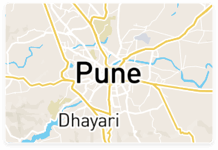Estimated Fees in India
₹ 300 to ₹ 500 per hour
Find PL/SQL Classes Fees in your locality
Post your Learning Need
Get customized quotes and responses from Tutors
Choose & Learn from Tutor of your choice

₹ 400 to ₹ 500

No data available

No data available

No data available

No data available

No data available
Lesson Posted on 22/09/2024

Vinayak V Dabgar
I am Vinayak, an Oracle Certified PL/SQL Developer and Oracle Certified DBA Professional with over 15...
2 of the new features of Oracle 23ai (previously Oracle 23c) with respect to SQL are discussed.
1. Boolean datatype included in SQL. Previously, boolean was not part of SQL, but belonged to Oracle PL/SQL.
Demonstration:
In this case study, the table bool_demonstration is meant to store the employee number, employee name and also with a boolean column to mark a contractor employee.
CREATE TABLE bool_demonstration (
empid NUMBER,
empname VARCHAR2(100),
contractor boolean
);
INSERT INTO bool_demonstration VALUES (
'101',
'Mike',
TRUE
);
INSERT INTO bool_demonstration VALUES (
'102',
'Tom',
TRUE
);
INSERT INTO bool_demonstration VALUES (
'103',
'Joe',
0
);
INSERT INTO bool_demonstration VALUES (
'104',
'Steve',
'Y'
);
INSERT INTO bool_demonstration VALUES (
'105',
'Michel',
FALSE
);
COMMIT;
TO_BOOLEAN:
On how to convert character values/numeric values, that were used to represent boolean value datatype in SQL to boolean values:
Using TO_BOOLEAN to explicitly convert character value expressions or numeric value expressions to boolean values.
SELECT TO_BOOLEAN(0), TO_BOOLEAN('true'), TO_BOOLEAN('no');
DUAL table (Dual is not needed now, but DUAL is not deprecated, it still works).
Before Oracle 23ai, DUAL was needed:
Select 1+1 from dual;
select (2+4)/6 from dual;
Previous versions of Oracle, these select statements did not work. With Oracle 23ai, the
select statements work. (without dual). Although DUAL table still exists and is not deprecated, we dont need to use DUAL table.
a. Calculations (without Dummy dual table)
select 1+1;
select (2+4)/6 ;
b.Calling a PL/SQL function without dual:
Create a simple function to demonstrate using functions in SQL statement (with and without dual for Oracle 23ai).
CREATE OR REPLACE FUNCTION fn_cal_circle_area (
p_radius IN NUMBER
) RETURN NUMBER IS
v_area NUMBER;
c_pi CONSTANT NUMBER := 3.142;
BEGIN
v_area := c_pi * power(p_radius, 2);
RETURN ( v_area );
END;
Before Oracle 23c:
SELECT
fn_cal_circle_area(5) "CircleArea"
FROM
dual;
Now,
SELECT
fn_cal_circle_area(5) "CircleArea";
read less
Lesson Posted on 22/09/2024
Oracle Database 23 AI New Features

Vinayak V Dabgar
I am Vinayak, an Oracle Certified PL/SQL Developer and Oracle Certified DBA Professional with over 15...
Answered on 22/11/2023

Nazia Khanum
Best Practices for Removing Duplicates in PL/SQL Queries
Introduction: As a seasoned PL/SQL tutor registered on UrbanPro.com, I understand the importance of efficiently handling data duplicates in PL/SQL queries. Removing duplicates is a common requirement in database management, and there are several strategies to achieve this in PL/SQL.
Methods for Removing Duplicates:
Using DISTINCT Keyword:
DISTINCT keyword in your SELECT statement.
SELECT DISTINCT column1, column2 FROM your_table; Aggregate Functions:
MIN or MAX along with the GROUP BY clause.SELECT column1, MAX(column2) FROM your_table GROUP BY column1; ROWID or ROWNUM:
ROWID or ROWNUM pseudo-columns to uniquely identify rows.
SELECT * FROM ( SELECT column1, column2, ROW_NUMBER() OVER (PARTITION BY column1 ORDER BY column2) as rnum FROM your_table ) WHERE rnum = 1; Online Coaching for PL/SQL:
For in-depth understanding and hands-on experience in PL/SQL, consider enrolling in specialized training courses. UrbanPro.com offers some of the best online coaching for PL/SQL training, providing a structured learning environment with experienced tutors.
PL/SQL Training Overview:
Why Choose UrbanPro.com for PL/SQL Training:
Conclusion: Removing duplicates in a PL/SQL query involves selecting distinct values using the DISTINCT keyword, leveraging aggregate functions with the GROUP BY clause, or utilizing pseudo-columns like ROWID or ROWNUM. For a more comprehensive understanding and practical application, consider enrolling in the best online coaching for PL/SQL training available on UrbanPro.com.
Have a question about PL/SQL Classes Fees? Ask your question and get answers from top Tutors.
Create your FREE UrbanPro profile and grow your income!
Find best tutors for PL/SQL Classes by posting a requirement.

Get started now, by booking a Free Demo Class